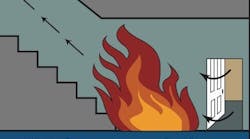Many firefighters grew up during a time when the words "exercise" and "physical fitness" held negative connotations. During school sports or gym class, it was common for poor performance to be punished with sit-ups, push-ups and running laps. The military had its dreaded obstacle course. On the rare occasions when people were seen exercising on their own, voluntarily, they were either trying to shed a few extra pounds or were probably "health nuts." Is it any wonder that many people still have very poor attitudes toward exercise?
A lot changed during the "Fitness Boom" that took place in the 1970s and '80s. Seemingly overnight, you couldn't turn on the TV or open a magazine without seeing somebody exercising. Thousands of health clubs opened across the country and exercise classes required reservations in advance. The field of exercise science gained prominence, and research showed again and again the many benefits to be gained through a healthy, active lifestyle.
Nowadays, physical fitness is seen in a very positive light, and people by the millions have incorporated regular exercise into their daily routines. Firefighters, because of the heavy physical demands of their work, are no exception.
Unfortunately, whenever people get enthusiastic about something, there are those who want to overdo it, and there are companies that will try to make a profit off these desires by selling products that make incredible promises. Such is the case with millions of "dietary supplements" available in stores, catalogs, and health clubs. The bottom line is that while many people buy these products, few of them have any real value.
There is no question that a complete, balanced diet is absolutely critical to health, physical fitness and athletic performance. But Americans are fortunate to live where food is plentiful and nutrients abound. By simply eating a regular balanced diet that encompasses a wide variety of foods, all of your body's nutrient requirements can be met easily. Even the firefighter who undergoes rigorous physical training does not require anything beyond a balanced diet to supply all the nutrients his or her body needs. In fact, in this country, true "nutrient deficiencies" are exceedingly rare; to the contrary, over-consumption (nutrient overkill) is very common.
Some people who follow a regular exercise program adopt the philosophy that "if some is good, more will be even better." Hence, they exercise too vigorously or too often, or try to push themselves too far in an attempt to rush their bodies toward their personal goal. This is called "over-training," and it is counterproductive. Many would rather believe in overnight results than in the dedication and discipline of a regular, long-term training program.
Along the same lines, millions of dollars are spent every year on dietary supplements, mega-dose vitamins, obscure minerals and other products because people believe these supplements will "fill in the cracks" of their diet or will give them an extra advantage toward gaining strength, muscle mass, stamina or peace of mind. Popular examples are protein powders, sports drinks, amino acids and herbs but there are many, many others.
Perhaps these people believe the more nutrients they cram into it, the more nutrients the body will use. But this is not the case. The human body extracts from the diet just enough to meet its needs but is unable to use any more. Any excess nutrients, in amounts over and above the body's requirements, are stored as fat or are left behind in the bathroom.
Most dietitians shake their heads when they see people rushing to buy the latest "hot" dietary supplement or magic pill. A Registered Dietitian (or R.D.), after all, has earned an academic degree that requires a license to practice. On the other hand, almost anyone can declare himself or herself to be a "nutritionist," a title which carries no certification, standards or assurance of scientific knowledge.
It is beyond the scope of this article to mention every dietary supplement currently on the market, and you can be sure that every few months a new "breakthrough" involving the "previously undiscovered effects" of some ordinary substance will come along to keep people's interest high and the revenues flowing. But bear in mind the fact that if such incredible claims were true, the manufacturing company would probably receive a Nobel Prize. Realize also that virtually all dietary supplements don't contain anything that can't be found in common foods, and that some substances in large amounts can actually be toxic and downright dangerous.
Whenever a new drug is developed, it must undergo rigorous testing by top government scientists. During this process, the drug's effectiveness and possible side effects are thoroughly examined before it can be sold to the public. But when something is labeled a "dietary supplement," it is considered a food (and not a drug), and food products traditionally have not been subjected to the same level of scrutiny. If they were, many of the claims made by their manufacturers would be exposed as false or misleading, and the products would never make it to your local health food store. Hence, manufacturers of dietary supplements can make all sorts of claims as to the effectiveness of their products.
These companies also pay celebrities to promote their supplements, creating the illusion that their physique or athletic success is due to the use of a particular product. There are large "network marketing" companies that will enthusiastically tell you about the wonders of their product, then try to recruit you as a distributor. And of course, there are always friends who will tell you how the supplement changed their lives and allowed them to achieve goals they didn't think possible. These "testimonials" have little credibility.
In controlled laboratory studies, the vast majority of dietary supplements have been shown to have no beneficial effect on strength, endurance, health or longevity. As mentioned before, the typical American diet has more than enough nutrients in it to satisfy the needs of even the most active, exercising person. Cramming more nutrients into yourself is like adding another gas tank to your car when you're only planning to drive down to the corner.
The human body has evolved into a remarkably efficient machine, designed for the optimum utilization of the nutrients present in the plants and animals we eat. More of a good thing simply isn't necessary it just means less money in your wallet.
Does Your Department Have A CISM Plan?
The great humanitarian Albert Schweitzer said, "The purpose of human life is to serve and show compassion and the will to help others."
For a firefighter or an emergency service worker, it's easy to relate to the above quote. Reading it very likely made you feel better about yourself. After all, you help to alleviate pain and suffering. And that gives purpose to your life.
Now, read it again and imagine you are among the "others" as a result of your sworn duties. Do you not deserve to have your pain and suffering relieved?
Generally, first responders do not fall apart in a crisis situation. This is due, in part, to their training, experience and personal character.
However, there is always the possibility of having to confront an overwhelming incident such as a bombing or plane crash with multiple deaths. Such experiences will stay with you forever and may evoke disturbed emotions and behavioral changes.
The criterion for a critical incident is not necessarily multiple death. When asked what type incident is most disturbing, rescuers usually say the death of a child. If they have children, and particularly if one is the same age as a victim that could not be saved, the potential for serious dysfunction is clearly indicated.
If untreated, traumatic stress may result in extended time lost from work, early retirement or resignation. Intervention via stress debriefing has been shown to reduce lost time and personnel turnover.
It's important that a fire department have an effective critical incident stress management (CISM) plan. If not, whoever is in authority should get one instituted. You owe it to yourself, your family and your co-workers to see that it is done. For more information contact the International Critical Incident Stress Foundation, 4785 Dorsey Hall Drive, Suite 102, Ellicott City, MD 21042. Telephone 410-730-4311.
By Ernie DiMaria
John Hayford, M.S., is an exercise physiologist and director of public safety and wellness at the National Hospital Medical Center in Arlington, VA. He has conducted health care and fitness programs for a number of fire departments and law enforcement agencies. Hayford is co-author of the textbook Comprehensive Wellness For Firefighters.
Ernie DiMaria is a retired FDNY lieutenant and author of the book FIRE: A War That Never Ends.






